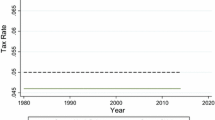Conclusions
In this paper, wasteful rent-seeking behaviour has been shown to have important implications for the determination of the welfare maximizing regulatory policies of replenishable natural resource industries. In general, the incorporation of wasteful rent-seeking activity into the analysis leads to policies which suggest a greater level of industry output than has been advocated by tradition policies that do not take rent-seeking into account. Our analysis therefore supports a more laissez faire policy than has been recommended in the literature.
Specifically, we find that when rents are completely dissipated by wasteful rent-seeking activity (t = 1), the role of the regulator is simply to guarantee biological efficiency, should this be threatened by the economic equilibrium achieved by the free-access of firms. One of two possibilities can occur. In the first, the economic equilibrium determined by the free-access of firms is biologically efficient, i.e., the equilibrium steady state of the replenishable natural resource exceeds or is equal to the maximum sustainable yield stock size (x MSY). If this occurs, the regulator needs to take no action whatsoever. In the second case, the economic equilibrium generated by the free-access of firms does not yield biological efficiency. The equilibrium is characterized by a steady state stock of the natural resource that is smaller that the maximum sustainable yield stock size, namely (x MSY < x MSY). In this case, therefore, the regulator does need to intervene, but his best policy takes the simple form of setting the total quota equal to the maximum sustainable yield (MSY) of the resource. Thus, while the results are to some extent consistent to those derived by Buchanan for the regulation of externalities, the fact that we are dealing here with replenishable resources adds a further dimension to the issue and changes some of the policy implications.
Similar content being viewed by others
References
Anderson, L.G. (1977). The economics of fisheries management. Baltimore: The Johns Hopkins University Press.
Appelbaum E., and Katz, E. (1986). Transfer-seeking and transfer avoidance: On the full social costs of rent-seeking. Public Choice 48: 175–181.
Appelbaum E., and Katz, E. (1987). Seeking rents by setting rents: The political economy of rent-seeking. Economic Journal, forthcoming.
Bhagwati, J.N. (1980). Lobbying and welfare. Journal of Public Economics 14: 355–363.
Bhagwati, J.N., and Srinivasan, T.N. (1980). Revenue-seeking: A generalization of the theory of tariffs. Journal of Political Economy 88: 1069–1087.
Buchanan, J.M. (1980). Rent-seeking under external diseconomies. In J.M. Buchanan, R.D. Tollison and G. Tullock (Eds.), Towards a theory of the rent-seeking society. College Station, TX: Texas A&M University.
Buchanan, J.M., Tollison, R.D., and Tullock, G., Eds. (1980). Towards a theory of the rent-seeking society. College Station, TX: Texas A&M University.
Hannesson, R. (1978). Economics of fisheries. New York: Columbia University Press.
Hartwick, J.M., and Olewiler, N.D. (1986). The economics of natural resource use. New York: Harper and Row.
Hillman, A.L., and Katz, E. (1984). Risk averse rent seekers and the social cost of monopoly power. Economic Journal 94: 104–110.
Hillman, A.L., and Katz, E. (1987). Hierarchical rent-seeking. Journal of Public Economics, forthcoming.
Katz, E., and Smith J.B. (1987). Taxes and quotas in replenishable resource industries: Two types of misallocation. Mimeo.
Krueger, A.O. (1974). The political economy of the rent-seeking society. American Economic Review 64: 281–303.
Plourde, C. (1979). Diagrammatic representation of the exploitation of replenishable natural resources: Dynamic iterations. Journal of Environmental Economics and Management 6: 119–126.
Posner, R.A. (1975). The social costs of monopoly and regulation. Journal of Political Economy 83: 807–827.
Smith, J.B. (1980). Replenishable resource management under uncertainty: A reexamination of the U.S. Northern Lobster Fishery. Journal of Environmental Economics and Management 7: 209–219.
Tollison, R.D. (1982). Rent-seeking: A survey. Kyklos 35 (Frac 4): 575–602.
Tullock, G. (1967). The welfare costs of tariffs, monopolies and theft. Western Economic Journal 5: 224–232.
Tullock, G. (1980). Efficient rent-seeking. In J.M. Buchanan, R.D. Tollison and G. Tullock (Eds.), Towards a theory of the rent-seeking society. College Station, TX: Texas A&M University.
Author information
Authors and Affiliations
Additional information
This research was supported by a grant from Fisheries and Oceans, Canada.
The authors would like to thank T. Cowan, C. Plourde and G. Tullock for helpful comments on an earlier version of this paper.
Rights and permissions
About this article
Cite this article
Katz, E., Smith, J.B. Rent-seeking and optimal regulation in replenishable resource industries. Public Choice 59, 25–36 (1988). https://doi.org/10.1007/BF00119447
Issue Date:
DOI: https://doi.org/10.1007/BF00119447




